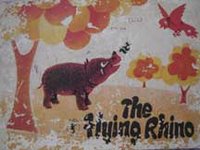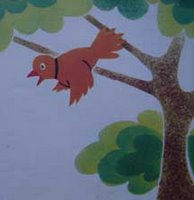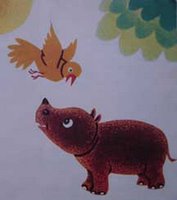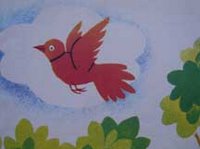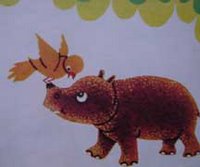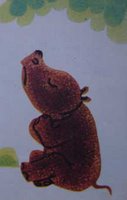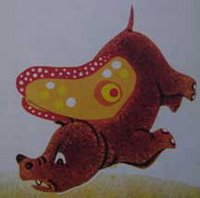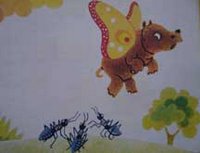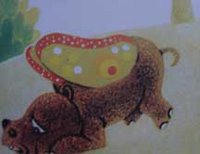 She's one porn star who has everyone 'excited', right from the government babus to the editors in the newsrooms.
She's one porn star who has everyone 'excited', right from the government babus to the editors in the newsrooms.
Though Savita Bhabhi has been back after the ban via a new domain, the resurrection also seems to have been obstructed. The new website www.kirtu.com doesn't seem accessible directly (there's always the other way around), atleast on the ISPs that I use. Apparently the process of denying access to the new website has already been initiated.
Shunned by her own government, Savita Bhabhi has found succour with the French. "France gives sexual asylum to Savita Bhabhi," could scream a headline (just couldn't resist using the term).
It might seem that, like our television channels, I'm blowing things out of proportion. Well, I am.
It's only that Savita Bhabhi has been published as a comic book (in ink and paper) by Editions Blanche, a French publisher specialising in erotic literature.
Titled Love in Bollywood also Bollywood in Love (depending on the cover you look at) the book was released a month back on October 22, 2009. The 96-page comic book authored by Deshmukh, has been designed by Dexstar and Madman (all pseudonyms).
The book, Bollywood in Love - les Aventures de Savita Bhabhi, (Bollywood in Love - The Adventures of Savita Bhabhi) is also available on Amazon France for €13.25.
All bans aren't bad, as many Bollywood producers would agree. The Indian government's restriction Savita Bhabhi has made her India's most famous porn star ever.
The widespread media coverage and online discussions have generated more following for the cartoon porn star than the ones in flesh and blood - Shakeela, Sunny Leone, Angela Devi, Priya Rai - put together.
Now that she's been published in other languages too, Savita Bhabhi might find a place along with the Kamasutra and Khajuraho whenever sex and India are mentioned together in the same sentence anywhere in the world.
Click here for the complete post...
Collapse this post
Before you get any ideas about me turning an author, let me clarify that the chaiwallah in question isn't the faux tea vendor who maintains this blog but a genuine one who has penned 18 books over 30 years. Watch the story of Laxman Rao aka Lekhakji.
Click here for the complete post...
Collapse this post
 The headline may sound as sensational as if it was from one of the television news channels (who are a major source of worry for the K-queen Ekta Kapoor). Though any such possibility might seem remote now (but you never know the ways of war) an Edmundian, Nitya Anand Chepuri has conjured this idea in his novel Tarbela Damned - Pakistan Tamed.
The headline may sound as sensational as if it was from one of the television news channels (who are a major source of worry for the K-queen Ekta Kapoor). Though any such possibility might seem remote now (but you never know the ways of war) an Edmundian, Nitya Anand Chepuri has conjured this idea in his novel Tarbela Damned - Pakistan Tamed.
I'm yet to read the book (will go looking for it today) but the plot does sound exciting, especially for a generation who have been brought up on the idea that our 'pesky' neighbour is the reason for all our ills. Two men who studied together in school - St. Edmund's Shillong - and then went on to IIT Madras. The Hindu, Rahul Sharma joins the RAW and the Jew, Solomon Rabban, migrates to Israel and joins the Mossad. The Irish Republican Army angle is due to the influence of an Irishman, Brother Manahan, who taught them in School (St. Edmund's is run by the Christian Brothers founded by Edmund Ignatius Rice at Waterford, Ireland). They join hands in pursuit of their mission, taming Pakistan.
There might be some parallels in the story line with the author's life who had studied in St. Edmunds before passing out from the Defence Services Public School and graduating from IIT Madras. He then went on to join the army. The reviews say that "there is no off-putting jingoism and no cold-bloodedness," which is indeed welcome for a novel with a title like Tarbela Damned - Pakistan Tamed.
Tarbela Dam, built across the river Indus, is Pakistan's largest dam and is therefore of vital importance for the country. And Pakistanis on hearing of an 'imminent danger' to it are understandably worried. Anand pointed me to a Pakistani military and strategic discussion forum, where some members took the plot of the novel for real and posted interesting reactions. Here are a few samples (unedited):* I can understand RAW and MOSSAD masterminding something but how does the Irish military come into this? Is this some troops in Afghanistan?
Anyway these dams need proper protection because RAW and MOSSAD can send mindcontrol zombies to do a suicide bombing on one of them. Dams are fragile and very hard to fix. I think its against the geneva convention to even bomb a damn during war.
* dams are not military targets, in war you are not meant to hit dams and if someone does then they will be nuked
* If the military stay in power then any such attack would be considered an act of war against pakistan. Doesn't matter who does it, Talibs or not, without dams pakistan would go down the drain. This is why we would ensure India goes down with us, meaning All nukes to indian and israeli cities. Also the factor of Indian nukes beng called a bluff, cause we're not sure if they can actually nuke us or not.
* Tell me a single time when the indian or israielies show honesty
* just imagine........
Bhakra Nangal Dam Damned, Bhangies tamed.
Ranjit Sagar Dam Damned, Bhangies tamed.
Gobind Sagar Dam Damned, Bhangies tamed.
Some comments were more realistic:* it was just a novel by an indian writer. The West, including Israel is not interested in de-stabilizing Pakistan.
Well, I learnt another thing from the thread. Indians are referred to as Bhangies across our western border - maybe due to the still prevalent caste system in our country.
Most well-meaning Indians do not want an instable western neighbour even though we might have fought many wars, the scars of which might take long to heal. Pakistan's stability is good for India. Being surrounded by so-called failed states is a precarious situation in today's volatile times. If India has to develop into a super power that it aspires to be, there has to be political stability and economic growth in all of South East Asia. Because the ground realities here are much different from what existed in the American continents.
You can find more details about the book here.
[Tarbela Damned - Pakistan Tamed
By CN Anand
Published by Indialog Publications
198 pages
Rs 195]
Click here for the complete post...
Collapse this post
 Tintin and his loveable whisky-loving and faithful fox terrier friend Snowy kept me in adventurous company during many a rainy afternoon. I owned very few of Tintin comics, the price was a big deterrent, but read almost all of them thanks to the comic exchange programme that we friends practiced. One which I missed was the very first one, published in 1929, Tintin in the Land of the Soviets (the other was the last but semi-complete - Tintin and Alph-Art).
Tintin and his loveable whisky-loving and faithful fox terrier friend Snowy kept me in adventurous company during many a rainy afternoon. I owned very few of Tintin comics, the price was a big deterrent, but read almost all of them thanks to the comic exchange programme that we friends practiced. One which I missed was the very first one, published in 1929, Tintin in the Land of the Soviets (the other was the last but semi-complete - Tintin and Alph-Art).
Wilfing on the Internet the other day, I accidentally discovered Tintin in the Land of the Soviets on Scribd. Though the artwork in Tintin's first adventure is a far cry from the ones later ones which carried our young reporter (though he's rarely seen doing what reporters usually do) and his four legged friend to different parts of the world (including India, particularly the kingdom of Gaipajama, complete with all the stereotypes of fakirs and the Indian Rope Trick).
The comic book though meant for children is also a critique on different existing political systems. Be it the coup curry of Latin America or the Japanese interference in China. Hergé or Georges Remi (this was a favourite question of quizzards during our time as the name Hergé is a result of transposition of Georges Remi's initials) did support monarchy as depicted by Tintin's friendship with the Maharaja of Gaipyjama or his help for King Muskar XII of Syldavia in King Ottokar's Sceptre. Tintin in the Land of the Soviets shows the Bolsheviks in a very poor light (very unlike what we were taught in the school texts during our time) and this was perhaps the reason why the comic was not available in India. A few examples:









Tintin had inspired a number of people to produce unofficial comic books - one being Tintin in Thailand where Tintin goes on a 'sex holiday' to Thailand (it also features almost all of the major characters) - and I too produced one. I was 14 and in Class VIII when I put my very own Tintin adventure on paper (with pencils, a black Pilot pen and Camlin sketch pens), titling my work Tintin in Shilliont, keeping alive Hergé's tradition of fictitious lands based on real places. Shilliont was Shillong. But unfortunately, I lost that comic. If I remember right, Kisholay Ray (now a budding photographer), a good school pal, who had a much better hand at drawing than me also had his own version.
Though an animated series on the Adventures of Tintin had appeared on television, which I rarely missed (now I'm again rerunning them on my mobile), nothing beats the experience of the comic book in paper.
Click here for the complete post...
Collapse this post
The once-a-river-now-a-drain which divides east Delhi from the rest of it, mythologically has a brother. The sister now maybe an embodiment of death and decay, but Hindus regard the brother - Yama - as the harbinger of the final farewell. Astride a buffalo, a mace in one hand and a rope in the other - he rules over the afterworld and strikes terror in the hearts of mortals. A vision not meant to entertain. But it does.
Of the 330 million gods and goddesses, it is he - the death god - who features in more non-mythological films and television serials. In his CRT, LCD or silver screen avatar Yama's arrival doesn't signify the end - it lightens the mood. Death is the comedian here.
Death is not funny, but black comedy makes us laugh. We know not what lies beyond, we only assume according to our beliefs. Some glorify death - the glorification is a necessity. Governments do it, militant groups do it. But while we are still breathing, why should we let something with a certain conclusion but uncertain timing come in the way?
Death, be not proud, though some have called thee
Mighty and dreadful, for thou art not so;
For those whom thou think'st thou dost overthrow,
Die not, poor Death, nor yet canst thou kill me.
From rest and sleep, which but thy pictures be,
Much pleasure; then from thee much more must flow,
And soonest our best men with thee do go,
Rest of their bones, and soul's delivery.
Thou art slave to fate, chance, kings, and desperate men,
And dost with poison, war, and sickness dwell;
And poppy or charms can make us sleep as well
And better than thy stroke; why swell'st thou then?
One short sleep past, we wake eternally,
And death shall be no more; Death, thou shalt die.
~ John Donne
Click here for the complete post...
Collapse this post
Anthony's post led to the acquisition of this book. Coincidentally purchased when fanatics were bursting bombs elsewhere in Delhi. Chetan Bhagat's second coming - One Night @ the Call Centre (Rupa & Co. Rs. 95) is nothing much to write about, even 50 days post reading. But there were parts, which stayed. Not for any literary brilliance but déjà vu.
Excerpts:
Prologue
Yes, you see it in the movies, you hear it from friends' friends but it never happens to you.When I was younger, I used to look at the reservation chart stuck outside my train bogie to check out all the female passengers near my seat (F-17 to F-25 is what I'd look for most). Yet, it never happened. In most cases I shared my compartment with talkative aunties, snoring men and wailing infants.
#7When girls call a guy 'teddy bear' they just mean he is a nice guy but they will never be attracted to him. Girls may say they like such guys, but teddy bears never get to sleep with anyone. Unless of course their moms hunt the neighbourhood for them.
#12'We get paid well, fifteen thousand a month. F**k, that is almost twelve dollars a day. Alas, I make as much a day as a US burger boy makes in two hours. Not bad for my college degree. Not bad at all. F**king nearly double of what I made as a journalist anyway.'
#12Settled? The words rewound and repeated itself in my head several times. What does it mean anyway? Just someone rich, or someone who gets predictable cash flows at the end of every month. Except parents do not say it that way because it really sounds like they're trading their daughter to the highest bidder. But in some ways they are. They do not give a damn about love or feeling or crap like that. 'Show me the money and keep our daughter for the rest of your life.' That is the arrangement of arranged marriage.
#13Now this is something women never have to deal with: standing next to your boss in the toilet as he pees is one of the world's most awkward situations. What are you supposed to do? Leave him alone or give him company and entertain him? Is it okay to talk to him while he is doing his business or not?
#14Not because they are better people. But because their country is rich and ours is poor. That is the only damn reason.
#15... 'life gets to you. You think you are perfectly happy - you know. good salary, nice friends, life is a party - but all of a sudden, in one little snap, everything can crack, like this stupid pane of the Xerox machine.'
#22I am constantly amazed at the ability of women to calm down. All they need to do is talk, hug and cry out for ten minutes - and then they can face any of life's crap.
#24Apart from blonde threesomes, I think hitting your boss is the ultimate male fantasy.
#26How did women manage before mirrors were invented?
#27'An air-conditioned sweatshop is still a sweatshop. In fact, it is worse, because nobody sees the sweat. Nobody sees your brain getting rammed,' ...
#28We passed by several advertising hoardings showing all kinds of people: a couple all smiles because they had just bought a toothbrush ... a young graduate jumping with joy, clutching a credit card ... All the ads had one thing in common. Everyone looked incredibly happy.
#28What is it about music that it makes you remember things you prefer to forget.
#34'Search. That is what we can do: Google will be our detective ...'
And one last one from the
AcknowledgementsMy one particular ex-boss. My life when I worked for him was living hell, and was probably the worst phase of my life. I used to wonder why this was happening to me. Now I know. Without that experience I would not have done this book. Thank you Mr Ex-boss for making me suffer. On the same note, I want to thank all the women who rejected me (too many to name here). Without them, I would not have known the pain of rejection.
Click here for the complete post...
Collapse this post
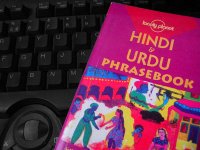
The PC had seemingly conked off, the only sign of life it showed was through incessant long beeps. After some speculation we (my roomie and me) interpreted it as an indication of undetected RAM. But multiple reinserting of the RAM bought forth no results. The beeps continued. Frustrated, we gave up. I screwed the cover back and feared for the cost. Then suddenly, without any intervention on our part, the blessed thing sprung back to life. Thank whosoever. But now I forgot what I wanted to write about. Anyway, I'll save that for a later date (in case I recall).
I usually enjoy reading travel guides, especially about the places I know relatively well. It provides a different perspective of the places we reside in. This is a sequel to that. Lonely Planet's Hindi and Urdu Phrasebook (another Daryaganj acquisition. Rs. 10 only) has some little gems. Sample these:
MOVIES
India produces more films than any other country, which suggests watching movies is a popular pastime. A successful film is also described as 'very powerful' while an unpopular film is often described as 'putrid and rotten.'
a successful and very powerful film
bahut zabardast
dhasu pikchar
an unpopular, 'putrid and rotten film
sari gali film
DID YOU KNOW ...
Particularly miserly people are sometimes referred to as:
kanjus makkhi chus
which literally means 'miser, fly sucker!' This means that a person is so miserly that if a fly were to fall into their tea, they would suck the tea from it before tossing it away!
SACRED COWS
The term 'sacred cow' (an institution, idea, person unreasonably held to be above questioning and criticism) comes from the respect cows receive by Hindus in India. It is not uncommon to see them meandering aimlessly through busy intersections and city streets. However, shopkeepers are not adverse to giving them a sharp whack if they take advantage of their elevated status and audaciously try to consume produce without paying for it.
WALLAH
The extremely useful adjectival suffix -vala is freely used in Hindi and Urdu and has come into English as 'wallah,' In fact there is hardly any word that may not be followed by -vala. It can be roughly translated as 'one who does...' or 'the one which is...'
So bloggers are simply blog
wallahs.
Click here for the complete post...
Collapse this post
 She's one porn star who has everyone 'excited', right from the government babus to the editors in the newsrooms.
She's one porn star who has everyone 'excited', right from the government babus to the editors in the newsrooms.


























